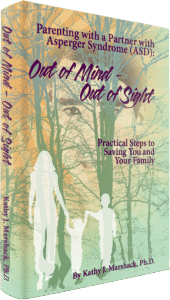
Out of Mind—Out of Sight:
Parenting with a Partner with Asperger Syndrome (ASD)
by Kathy Marshack Ph.D.
Kindle $19.99 
Paperback $28.65 
Out of Mind – Out of Sight: Parenting with a Partner with Asperger Syndrome (ASD), takes an honest look at the unique issues that come up when you’re co-parenting with an Asperger partner. It’s a tough assignment because for the Aspie (ASD) parent so many of the interactions within the family circle, that require empathy, are literally out of mind – out of sight. This is essential reading for the Neuro-Typical (NT) parent to learn more about Asperger Syndrome and find a way to co-parent, co-exist and even thrive within the Asperger/NT family unit. Author Kathy J. Marshack, Ph.D, is a licensed psychologist with more than 33 years of experience as a marriage and family therapist, and a parent of a daughter with AS. This book is a follow-up to her first book to explore Asperger relationships, Life with a Partner or Spouse with Asperger Syndrome: Going over the Edge? Practical Steps to Saving You and Your Relationship, which garnered worldwide attention due to its unforgivingly realistic portrayal of loving someone with Asperger’s. Once again, in this new book readers will find it is not a quirky, upbeat human-interest story on Asperger Syndrome. Instead, Dr. Marshack doesn’t pull back from revealing the harsh realities that a Neuro-Typical (NT) faces in parenting with someone who doesn’t fully understand them or their children. However, she also provides hope and practical solutions on how to co-parent more successfully. How is an NT parent supposed to share the multi-dimensional work of parenting with a spouse who has no concept of the empathic glue that holds the parent/child relationship (and the parent/parent relationship) together? There are no shortcuts and no easy answers, but the question is explored in all its multi-faceted complexities. In the first part of the book, Dr. Marshack introduces the reader to the daily life of AS/NT co-parenting. There is no analysis, just raw emotional experiences that will resonate with readers who are living this life. Next, readers will be compelled to shed some of their preconceived notions as Dr. Marshack explains the science behind these troubling relationship as well as state of the art theories on Asperger Syndrome (ASD). At the end of the book Dr. Marshack provides specific techniques to help readers implement the changes they want and need to make to revive their marriage and their parenting as well as reclaim their personal freedom.
To receive a complementary copy of a chapter from Out of Mind—Out of Sight, subscribe to our newsletter below. We’ll give you instructions to get your free download.
In praise of Out of Mind—Out of Sight
“I just finished reading “Going Over the Edge?” and “Out of Mind—Out of Sight.” I am an NT child/parent Hapa Aspie. I identify with your character Helen and her family. The short way to express what I’m feeling is that this is the first time ever in my 45 years of life that I don’t feel alone anymore!!! My body has been shaking for the past few days and my mind will not settle because I have finally found myself. Your willingness and courage to expose the details of your life and those of others has provided such a gift of insight and the beginning process of healing in my life.”
“A guidebook offering new insights and practical advice for dealing effectively with a spouse or child diagnosed with Asperger’s syndrome. Asperger’s is one of many disorders on the autism spectrum that impairs social skills. Marshack (Going Over the Edge?, 2009) brings decades of experience as a psychologist, family therapist, and wife and mother of an Asperger’s-affected spouse and children to this revealing look at a commonly misunderstood disorder. In Part 1, she discusses common behaviors of people suffering from Asperger’s and of “neurotypical” family members who are not impaired but trying to cope. She offers a poignant account of her own bewildering experience raising her eldest daughter, whose Asperger’s presented itself well before the diagnosis was generally understood by the medical community. Readers will empathize with the author’s “helicopter mom” behavior with her socially impaired child and will feel her pain as she’s ultimately forced to let her daughter go. In Part 2, Marshack reveals the condition as essentially an empathy disorder and discusses the works of experts such as Simon Baron-Cohen (who studied neuroscience and empathy disorders), Adam Smith (who advanced the Empathy Imbalance Hypothesis) and Peter Vermuelen (who examined the concept of “context blindness”). She also introduces the idea of “Rules of Engagement,” which sufferers can use as a way to relate to people without feeling true empathy. Parts 3 and 4 offer additional insights into the lives of neurotypicals, who often feel invisible and ignored, and elaborate on coping strategies introduced in earlier chapters. The author mercifully keeps the clinical jargon to a minimum, and the prose is cogent and well-organized throughout. At the end, she provides links to online support groups, websites, phone numbers and other helpful resources. Her personal accounts of her family life and clinical practice should resonate with readers seeking to understand Asperger’s and may help to assure them that they are not alone. A useful, enlightening guide to understanding and coping with Asperger’s syndrome.” — Kirkus Reviews


